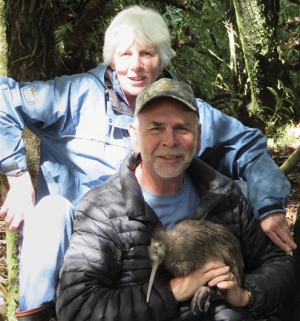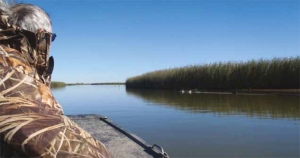From New Zealand it was easy over the internet to book some days duck shooting and fishing. However the doubts begin to creep in when you travel all the way to the “Great Wetlands of the South” in this case Louisiana, USA.
The Judge and I travelled to New Orleans by car starting from Dallas, then down the only road that leads into the most southern of the Louisiana marshes the road ending at Venice. The trip down the road had been a revelation in itself, six years after Hurricane Katrina with scars still visible where houses had been washed away, the rebuilding was impressive with all the houses and even a new high school built 18 feet off the ground.
Katrina had almost wiped Venice off the map, but rebuilding had given it a go-ahead feel and our accommodation was like everything else, built 18 feet up in the air. At 5am in the morning waiting, for our guide who was fashionably late, it was a dark and lonely place. The only other person we had seen was the cook at the bar cum restaurant who had made us a breakfast sandwich when she opened at five.
Eventually a bearded young man turned up towing a flat-bottomed duck boat. Yes, he was our guide and we should get in. Winston Churchill once described the English and Americans as two people divided by a common language, with this guide it was more of an insurmountable gulf than a divide. Suffice to say he thought we talked funny! From our part he was almost unintelligible.
The trip through the wetlands was interesting in pitch dark with no lights. We either went flat out or with alarming severity dead slow. With dawn breaking, the boat slowed again and our guide started throwing out decoys. This must be the spot we surmised. After going in circles for a few minutes we eased into a slot cut in the reeds, a thin screen of stalks kept us hidden from the ducks. “Load up!” came the command from our intrepid guide. Loaded I looked up to see a duck set its wings to come into the decoys, our guide had his head down looking at his cellphone, so I shot it. Our guide exploded from his seat demanding to know “what **** **** *** was I doing?” I pointed out I had just shot a gadwall (type of duck), which was now as dead as the proverbial dodo and was drifting away on the current.
This got a lecture from our guide which when condensed amounted to us only shooting when he said to do so. About an hour later I enquired if we might see any more ducks at this spot as apart from the one I had shot we had not seen another. Our guide explained that he was mystified by the absence of ducks as he had shot limits from this very spot every day so far this week!
The Judge at this point went very quiet. I asked if we had a plan “B” as it was not a happening thing where we were. With some muttering our guide started the engine and backed us out of the hide. We helped pick up the decoys and the gadwall I had shot which was hung up on a branch touching the water some hundred metres away from the hide. We were soon speeding through the marshes. In the daylight they were pretty amazing, vast impenetrable forests of reeds occasionally a few trees far in the distance surrounded by reed, narrow channels which suddenly opened up to vast expanses of open water. Almost unbelievably, some of the areas were in private ownership and the duck hunting rights to those areas are fiercely protected. And almost more amazingly, oil pipelines ran from offshore platforms through the marsh to holding tanks many miles inland with marker posts every time they crossed under open water, and there were a lot of them. Birdlife was patchy; on open water areas there were sometimes a flock of birds, spoonbills, pelicans, wading birds and most importantly ducks. They say there are 735 species of birds, fish and mammals that use the Louisiana wetlands.
We arrived at a lagoon, which was open to the sea on one side although the sea was probably a few miles away, but I could just see the white water from the waves breaking over rocks or a sandbar. Out went the decoys again and we slipped in between two screens of reeds growing in the middle of the lagoon hundreds of yards away from any cover. This time we were in the right place as there were ducks trading around.
Our guide started calling, it went something like, quack quack quack, “Keep your head down,” quack quack, “I said keep your head down,” quack quack “KILL’EM.” At which point we were supposed to leap up and shoot the ducks, the problem was that with our heads down when we got up to shoot we had no idea where the ducks were, if they were directly in front no problem but if they were to the side or behind us by the time we turned to shoot they were already out of range. Added to that a Cajun yelling “KILL’EM” at the top of his voice flared the ducks before we even had a chance to stand. This happened a couple of times with the inevitable lack of success, the next time our guide called the ducks in range after yelling “KILL’EM” he promptly fired his shotgun in the direction of the ducks.
Enquiring if he was shooting his own birds, he replied to the effect that he was shooting our limit as if he didn’t we would be going home empty handed. The Judge, at this point suggested that our guide might care to indicate just where the ducks were before he yelled “KILL’EM.”
He pointed out the positions of a clock – 12 o’clock in front, 6 o’clock behind, 9 o’clock to the left and 3 o’clock to the right, pointing up he said high, pointing down low. Really the morning had just reached a new low, at least I thought it had, but I was wrong. While we had been discussing how to tell the time some teal had dropped in and were sitting in the decoys about 40 metres away. “Kill em” said our intrepid guide “NO way “, said I, “They are on the water”, “Don’t matter,” says our guide. “Th’re trash birds and it is legal to sluice them on the water.” The teal had at the sound of our raised voices had the good sense to flock off.
To be honest after that my heart wasn’t in it, we scratched down enough ducks for two limits with our guide shooting most of the time. The Judge not to be out done was faster than a yelling Cajun and shot well including a beautiful Bald Plate American Widgeon, in full breeding plumage, which our guide informed us was his, as it was the best he had ever seen.
Not being the most intelligent human being I had ever met, our guide had forgotten to count the gadwall I had shot first thing and we were one bird over our two limits. One of the birds was deposited at the bottom of the decoy bag incase we met the warden and we were off back to the dock in time for lunch.
We consoled ourselves with a good lunch and some alcoholic beverages and assured each other that the morning was over and fishing this afternoon would be much better with our fishing guide. We arrived at the dock at the appointed hour to meet our fishing guide; nosing into the dock was a sleek 20 foot fishing machine with you know who at the helm. To say the reception was frosty would be putting a good face on it. As it turned out, our intrepid guide was a better fishing guide than a duck-hunting guide and by the end of the afternoon we had almost forgiven him for the morning.
We were fishing for red fish and we got into some seriously good fish. It’s a sad fact that even though we were not taking any fish away with us every legal fish that came on board was promptly knocked on the head. It would appear to be a matter of pride for the guides not to come back to the dock without limits of fish for everyone in the party. In the end we gave the fish away to the people on the dock. After a successful afternoon our feelings towards our guide had softened to the point we invited him to join us for a beer or two at the bar by the dock.
He refused!
Graham Gurr


